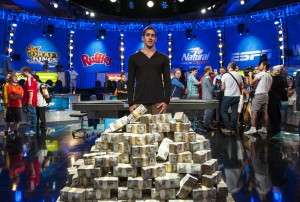Poker Ambassadorship: An Obligation or a Choice?
Author’s Note: The opinions expressed herein do not necessarily reflect the viewpoint of FlushDraw.net or its owners.
This week, Daniel Colman, a fantastic 23-year old poker player who specializes in heads-up games online, won the million dollar buy-in Big One for One Drop at the 2014 World Series of Poker. He won over $15 million, rocketed up the all-time live tournament winnings list, and immediately became one of the biggest names in poker for being the winner of one of the most prestigious events of the last few years. It was a great day for Colman and a great celebration for poker, especially because over $4.6 million was raised for the One Drop organization.
But afterwards, Colman raised eyebrows (and the ire of some poker media outlets and poker fans) when he declined the traditional post-victory interviews with WSOP officials and poker news websites. He did eventually grant a brief interview to ESPN, which filmed the tournament for broadcast, but deflected the attention away from himself and towards One Drop.
Colman later posted on Two Plus Two to explain his reasons for declining interviews, saying, amongst other things, “I don’t owe poker a single thing.”
I won’t use this space to dissect his post, but he does bring up an interesting point. Should big winners, namely the people who win super-major tournaments like the WSOP Main Event that garner mainstream media coverage, be expected to become “ambassadors” to the game? Do they owe anything to the poker community?

Daniel Colman
Image Credit: WSOP.com
Put simply, no. Poker players put up their own money to participate in games, be they tournaments or cash games. For most of us, if we have a bad day at work, it’s just a bad day. We still get paid. If a poker player has a bad day, he not only doesn’t get paid, but actually loses money, as well. They owe nothing to anyone but themselves.
But what about professional athletes? Everyone expects them to make public appearances, help out in their local communities, give interviews, sit for press conferences, and more. Why shouldn’t poker players who make tons of money do the same? Again, it comes back to the source of the money. The sports teams pay a player’s salary. They can dictate, within reason, what obligations the athlete has. Additionally, athletes who play on teams (things are different for athletes in individual sports such as golf and tennis) represent cities and states. Non-sports fans may think it’s silly that we often base our civic pride on the success of our sports teams, but hey, them’s the facts. And part of representing a community is being an ambassador of the team and of the sport in that community.
Poker players draw a salary from no one, they represent no team, no community. They are independent contractors, in a sense. As such, they represent themselves. Anything they wish to do above and beyond playing poker and earning a living (or, as an amateur, earning a monstrous payday), is up to them.
Of course, some players are sponsored by poker rooms, so in that case, they may have some obligations to represent the poker room at tournaments or at events. That all is up to the player and poker room.
Would it have been better had Colman given another 30 minutes or so to the media after his big win? Yeah, probably. But really, it was not that big of a deal. If I was in his situation, I would imagine it would be fun for me to do some interviews and soak up some of the attention, however fleeting it might be, that comes with a win of that magnitude. But I’m not the same person as Daniel Colman. I’m a husband and father of two who is on the backside of his 30’s and whose largest buy-in for a tourney has been $100. I have no desire for a “baller” lifestyle or super-fame, but I feel like it could be fun to be ambassador for poker for a while. Colman just plays poker for money. And that’s fine.
You can’t just make someone an ambassador of poker. He has to want to be one and there has to be a compelling reason for people to want to pay attention to him. Colman obviously has part of that compelling reason settled, but if he doesn’t want to be the Grand Marshall of the Poker Parade, then there is no reason to force him to and no reason to begrudge his motivations for playing poker. Poker ambassadors are not appointed like U.S. ambassadors to foreign countries. They are developed organically.
Take the late, great Chad Brown, whom the poker world mourned this week. Yes, he had a position as a public figure when he hosted a television show, but that just gave him a jump start. He was a great poker player, had an outgoing personality, was intelligent, and enjoyed talking to people. He was a natural representative of the poker community and he seemed to relish it.
If someone in a position to carry the same banner, be that person Daniel Colman, the next WSOP Main Event winner, or anyone else, doesn’t want to do it, who cares? People have different motivations for doing what they do; it is unfair to shoehorn them into a shoe that does not fit.



















COMMENTS